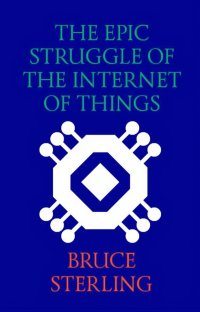The Epic Struggle of the Internet of Things = Эпическая борьба за «Интернет вещей»
Покупка
Тематика:
Интернет
Издательство:
Стрелка Пресс
Автор:
Стерлинг Брюс
Год издания: 2017
Кол-во страниц: 43
Дополнительно
Вид издания:
Научно-популярная литература
Уровень образования:
Дополнительное профессиональное образование
ISBN: 978-5-906264-30-5
Артикул: 688026.01.99
If the hype is to be believed then the next big thing is the Internet of Things.
But is it what you think it is? Because the Internet of Things is not about things
on the internet. A world in which all our household gadgets can communicate with
each other may sound vaguely useful, but it’s not really for us consumers. The
Internet of Things serves the interests of the technology giants, in their epic
wrangles with each other. And it is they who will turn the jargon of «smart cities»
and «smart homes» into a self-fulfilling prophesy. In this piercing and provocative
essay, Bruce Sterling tells the story of an idea that just won’t go away because
there’s too much money to be made and a whole world to control.
Тематика:
ББК:
УДК:
ОКСО:
- 09.00.00: ИНФОРМАТИКА И ВЫЧИСЛИТЕЛЬНАЯ ТЕХНИКА
- 10.00.00: ИНФОРМАЦИОННАЯ БЕЗОПАСНОСТЬ
- ВО - Бакалавриат
- 09.03.01: Информатика и вычислительная техника
- 09.03.02: Информационные системы и технологии
- 10.03.01: Информационная безопасность
ГРНТИ:
Скопировать запись
Фрагмент текстового слоя документа размещен для индексирующих роботов
STRELKA
СТЕРЛИНГ БРЮС ЭПИЧЕСКАЯ БОРЬБА ЗА «ИНТЕРНЕТ ВЕЩЕЙ» 3-е издание (электронное) Москва «Стрелка Пресс» 2017
STERLING BRUCE THE EPIC STRUGGLE OF THE INTERNET OF THINGS 3-rd edition (electronic) Moscow Strelka Press 2017
УДК 72
ББК 85
S82
Sterling, Bruce.
S82 The Epic Struggle of the Internet of Things = Эпическая борьба за «Интернет вещей» [Электронный ресурс] / B. Sterling. — 3-rd ed. (el.). — Electronic text data (1 file pdf : 43 p.). — М. : Strelka Press, 2017. — System requirements: Adobe Reader XI or Adobe Digital Editions 4.5 ; screen 10".
ISBN 978-5-906264-30-5
If the hype is to be believed then the next big thing is the Internet of Things. But is it what you think it is? Because the Internet of Things is not about things on the internet. A world in which all our household gadgets can communicate with each other may sound vaguely useful, but it’s not really for us consumers. The Internet of Things serves the interests of the technology giants, in their epic wrangles with each other. And it is they who will turn the jargon of «smart cities» and «smart homes» into a self-fulfilling prophesy. In this piercing and provocative essay, Bruce Sterling tells the story of an idea that just won’t go away because there’s too much money to be made and a whole world to control.
УДК 72
ББК 85
The source print publication: The Epic Struggle of the Internet of Things / B. Sterling. — Moscow : Strelka Press, 2014. — 42 p. — ISBN 978-5-906264-30-5.
ISBN 978-5-906264-30-5
© Strelka Institute for Media, Architecture and Design, 2014
1.
The first thing to understand about the “Internet of Things” is that it’s not about Things on the Internet. It’s a code term that powerful stakeholders have settled on for their own purposes.
They like the slogan “Internet of Things” because it sounds peaceable and progressive. It disguises the epic struggle over power, money and influence that is about to ensue. There is genuine internet technology involved in the “Internet of Things”. However, the legacy internet of yesterday is a shrinking part of what is at stake now.
Digital commerce and governance is moving, as fast and hard as it possibly can, into a full-spectrum dominance over whatever used to be analogue. In practice, the Internet of Things means an epic transformation: all-purpose electronic automation through digital surveillance by wireless broadband. In this essay I’ll describe how this is likely to work, and what the major players think they are doing to get there.
To begin, though, I must first free the reader from any folk ideas about the Internet of Things.
So, let’s imagine that the reader has a smartphone in one hand, as most people in the Twenty-Teens most definitely tend to. In the other hand, the reader has some “thing”. Let’s say it’s the handle of his old-fashioned domestic vacuum cleaner, which is a relic of yesterday’s standard consumer economy.
As he cheerfully vacuums his home carpet while also checking his Facebook prompts, because the chore of vacuuming is really boring, the reader naturally thinks: “Why are these two objects in my two hands living in such separate worlds? In my left hand I have my wonderfully advanced phone with Facebook - that’s the “internet”.
— 5 —


